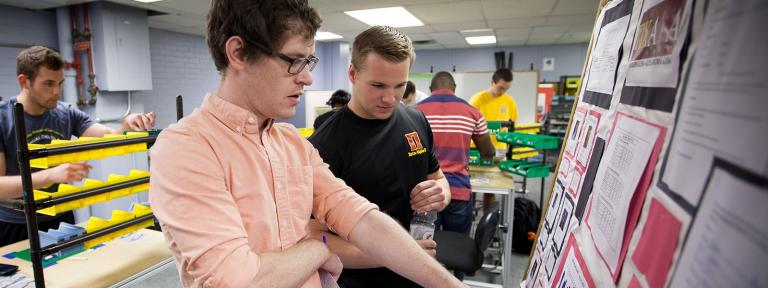
When one thinks of Legos, they often envision small children constructing elaborate buildings and vehicles that defy engineering theories.
But at Kettering University in Flint, Mich., Legos are an important component in teaching high school students about the work of industrial engineers and in encouraging them to consider industrial engineering (IE) as a potential career path. Since many of these students are unfamiliar with the work of an engineer in general, Kettering’s IE Airplane Demonstration Workshop provides a quick understanding of this field through hands-on activities that ultimately show them how cool engineering is.
Dr. Lucy King, interim department head for Industrial Engineering, said that this workshop grew out of a concern expressed by Kettering students about the lack of enrollment in IE.
“They wanted to do something to help increase recruitment efforts, to get high school students thinking about IE as a possible college major and career,” King explained, adding that this effort “is one of the first recruitment/public awareness efforts by IE students.”
So the students worked with Associate Professor Terri Lynch-Caris of IE to develop the IE Airplane Road Show. The goal is to give high school students assembly criteria and a set of Legos to create a plane utilizing the following five-step process:
- assembly of front fuselage;
- assembly of wing structure;
- assembly of tail;
- assembly of accessories/peripherals, such as landing gear; and
- quality check.
High schools students participating in the project include a number from Oakland Schools Technical Campus (OSTC) Northwest in Clarkston. Kettering students split the high school students into teams of five or six. The teams then engaged in the five-step process and were timed to determine how swiftly they could construct their Lego planes. At the end of the timed process, Kettering students calculated the number of good assemblies.
Teams were then rated by the number of unfinished assemblies against the number of finished assemblies. After this, the teams had an opportunity to discuss the assembly issues, determine a course of action to rectify these issues and increase quality based on suggestions from the Kettering students. Then they could redo the round to try and increase their overall score.
According to King, the high school students made considerable improvements in each round and quickly learned several lessons on how IEs work to improve engineering and manufacturing processes.
“This really helped them see what industrial engineering is all about,” she said. “They seemed to enjoy the workshop and the interaction with the Kettering students,” she added.
Teachers from the Oakland Schools Technical Campus agree with King’s assessment.
“The students had a basic understanding of engineering and little understanding of the different engineering disciplines,” said Teacher Robert DuCharme. “The workshop was very important in aiding the students in understanding what an IE career entails,” he added.
DuCharme also said that when his students were told about the workshop, they were skeptical at first. However, by the end of the program, they were enjoying the experience and the hands-on approach, including the challenging workshops.
“The Kettering students were fun, engaging and professional throughout the entire event,” he said.
Teacher Don Peters also felt the workshop was productive.
“Our students had no previous knowledge regarding the work that an industrial engineer performs in their career,” he said. “The Kettering students did a great job interacting with OSTC students and we’re looking forward to engaging in another workshop in the near future.”
The IE Airplane Demonstration Workshop is comprised of several components. At the start of the program, Kettering students, along with King, explain to the high school students what industrial engineers typically do during their careers. The Kettering contingent then shows a video about these careers, which features engineers working at Disney World, UPS, automotive companies as well as for hospitals among other areas.
“We try to show them that any job or company that deals with developing and implementing a process needs industrial engineers, since these professionals often take responsibility for this kind of work,” King noted.
After this lecture and video presentation, the Kettering contingent discusses the workshop, issues of quality, the rules for the competition and the importance of providing feedback to King and the students regarding the experience. King and the students also discuss with the high school students subjects such as LEAN operation, logistics, scheduling and other aspects related to an industrial engineering job.
Perhaps one of the most important features of this workshop is the opportunity for current college students to go out and explain what an IE does to those who might consider this as a career field. Instead of hearing about the IE field from a professor or parent, high school students are able to relate more directly to the experiences of college students studying the discipline, which could potentially persuade younger students to consider IE as a career path.
King said that she expects to conduct this workshop again in the near future.
To learn more about this workshop or industrial engineering, contact Dr. Lucy King at (810) 762-7850, via email at lking@kettering.edu or visit Kettering’s Industrial Engineering Department website.
Written by Gary J. Erwin
810.762.9538
gerwin@kettering.edu